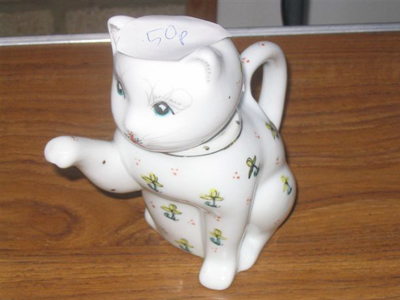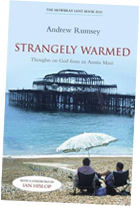| |
|
|
 |
 |
 |
| The last enemy to be destroyed is bric-a-brac |
 |
June 2008
We have just had a bric-a-brac sale at church. In these murky areas of religion, it is vital to define one's terms. Bric-a-brac, in the unerring words of Harry in my congregation, is "hard jumble", and after the locusts have gone, we still have six creaking trestles of the stuff.
Surveying the wondrous dross this afternoon, perhaps I can tempt you with a porcelain kitten, lifting its paw in a pleading posture? Or maybe a wobbly mug tree, or some rose-shaped tealights, or a pair of comedy antlers? No? Then how about a frankly unsettling model scarecrow stuffed with raffia, or more dried flowers than you could shake a dried stick at? Be my guest. Please.
Human beings, the Book of Genesis tells us, are made in the image of God: they are distinguished from other creatures in significant ways. Some point to our senses of wonder or humour as marks of this difference; others to our capacity for reflection or rational thought. Personally, I am clear that what sets us apart from the apes is bric-a-brac: our capacity to create it, collect it, and still have 12 baskets of it left after all else has been consumed. Scuttle aside, O cockroach; lay low, ye ancient hills of disposable nappies, for bric-a-brac will outlast you all.
A bric-a-brac sale captures the human condition in a nutshell – actually in a porcelain nutshell surmounted by a rustic fisherman. It is truly remarkable how we imitate creation by reproducing it in microform, and then fetishize what we have made. Even in ages and cultures not so bulimically gorged with stuff as our own, bric-a-brac persists, with toys and ornaments emerging from old cans or scraps of soap. We are instinctively artistic, even if most of our art lacks a certain divine spark. Extracting a rib from Adam's prone form, the Lord fashioned the fathomless beauty of womankind. You can bet that Adam, presented with the same rib, would have whittled it into a pipe rack.
Human aptitude for creating things may positively reflect our status as creatures, but, as the second Adam observed, this knack for hoarding up our little treasures is a crucial crack in our clay. Our desperate, pointless love of things is, like all idolatry, ultimately self-centred and only bound for decay. Hell could well be a closing-down sale where wailing shoppers tussle over trinkets, as if their deaths depended on it.
If it lies anywhere, salvation is in releasing our sweaty grip, and saying "after you". This is what George Steiner calls the courtesy of true art, which doesn't seek to grab, smother and possess, but stands back to make space, regardless of personal cost.
You can do this at a bric-a-brac sale, of course, although it won't raise much money for the new church hall. But then bric-a-brac is already inherently cheap – that's part of its appeal. Driving recently through a small town in North Wales, I passed one of those fearful shops selling "fancy goods". As I waited at the lights, my blood quietly curdling, I noticed that we were being enticed inside by a pile of opaque plastic bags, all tied at the top. Above them was a sign which read "bags of bric-a-brac, 50p".
The idea that you might pop out for a random assortment of bric – or indeed brac – without knowing what was in it, struck me as truly priceless.
Perhaps curiosity is to blame. In Greek mythology, Pandora is given an interesting bit of hard jumble by Zeus: a box (no doubt made out of clothes pegs by Zeus's dad), which he forbade her ever to open. Having been to numerous bring and buy sales, though, Pandora naturally wanted to peek inside to see if the box contained some other pleasing trifle – a jigsaw, perhaps. When she did so, we are told that the evils of mankind – plague, sorrow, poverty, crime (and, I hazard, the intemperate love of fancy goods) burst out upon the world, though she shut it just in time to preserve one last quality, hope. Learning her lesson, Pandora quickly passed the box on to her local Cancer Research.
The ballooning business of charity shopping to a certain extent redeems our crazy craving by offering a guilt-free path to self-indulgence. But when Sue Ryder or the Cats' Protection League own every other shop on your high street, two things at least are clear: first that the ground rents are too high and second, that we all have far too much stuff.
In the limitless tide of unwanted flotsam that swills and spills between these emporia, there is a kind of food chain. If one was especially perverse, one could map the progress of an item of bric-a-brac – say a Charley Pride album or a commemorative teaspoon – and find the point at which it was successfully scavenged, found a home or finally entered the landfill.
Which is probably where we will pay the true price for our inconspicuous consumption. Until then, though, we all love a bargain. |
|
|
 |
 |
 |
| Strangely Warmed by Andrew Rumsey is now available as a book. |
 |
 |
 |
 |
 |
| Stephen Tomkins' regular column of tales of religious lunacy from the far reaches of the Net |
 |
 |
 |
| Mark Howe's regular rant about Internet culture |
 |
 |
 |
| Also by Stephen Tomkins... a regular round-up of the saints of yore who were one wafer short of a full communion |
| |
|
|
|
|


